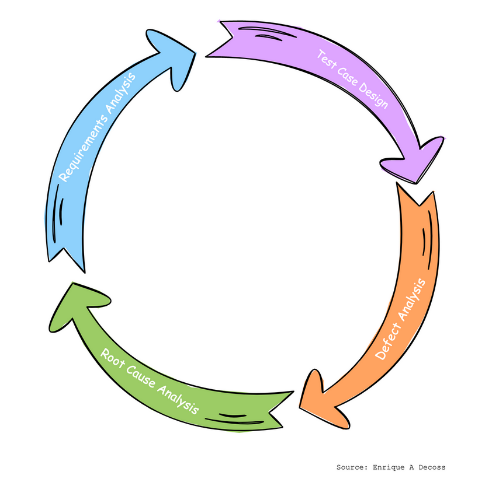Analytical Aspects in Software Testing

Software Testing is analogous to the scientific method, or at least to the scientific experiment. Many have been written about similarities between a hypothesis and a test goal, between running an investigation and a test, and between the apriori expected results in both disciplines.
Testers work similarly, ferreting the truth from the requirements myths and outright lies. For example, I like the idea of the second law of thermodynamics - All things trend toward disorder. More specifically, the second law of thermodynamics states that “as one goes forward in time, the disorder of any isolated or closed system will always increase (or at least stay the same).”
As Testers, we must help uncover the inherent chaos introduced in complex systems/applications. Developers constantly work to make their code and integrations around them more orderly, but as mentioned, chaos is part of the universe and part of our systems, and those things come to mind when bad things happen, and order breaks down.
Brief about being Analytical
Organizations hire people with analytical skills who can find solutions quickly and efficiently. We have several behavioral indicators of Analytical Skills, such as collecting and extracting relevant information to identify the cause of the problem or misbehavior. It is vital to break down the problem into small parts to work efficiently, determine the logical and factual outcomes based on information, and identify actions to ensure the situation does not repeat or occur frequently.
Analytical thinking is vital for the growth of individuals and their organizations. People who think analytically can recognize problems even before their occurrence, i.e., have perfect foresight based on the information they collect. Thus they can plan well ahead of time and tackle any issue or specific situation.
This skill also enables increased productivity as analytical thinkers learn to break down a larger problem into manageable goals, and can be achieved with the coordination of the team. Lastly, these skills help individuals have a growth-oriented mindset, as analytical thinkers do not fear any problem. Instead, they try to find the best possible solutions to the problem with the available resources.
Software Tester Critical and Analytical Thinker
Both thinking styles examine facts to help a Software tester evaluates information but depend on them differently. Those applying analytical thinking to a situation use facts to support evidence. However, those applying critical thinking rely on facts to help them form an opinion and determine whether an implementation makes sense.
These two thinking methods also involve different components to help Software Testers validate specific aspects. For example, in the analytical thinking process, a QA focuses more on evaluating requirements and guides. In contrast, in the critical thinking process, they focus more on avoiding happy paths and experimenting with the implementation. In addition, critical thinkers consider alternative routes (Whatif situations), while analytical thinkers apply logic and reasoning to situations.
How can analytics help you with software testing?
Requirements Analysis. Analytical thinking allows testers to evaluate software requirements to identify potential issues or gaps thoroughly. It helps ensure that the software meets the needs of the end users and that all relevant features are tested.
Test Case Design. With analytical thinking, testers can develop comprehensive and practical test cases that cover all relevant scenarios and validate the software's functionality. In addition, it helps ensure that all relevant parts of the software are tested and that no defects are missed.
Defect Analysis. Analytical thinking also helps testers analyze test results to identify and diagnose defects. In addition, it allows them to determine the root cause of the problem and work with the development team to resolve it.
Test Effectiveness Evaluation. Analytical thinking can also be used to evaluate testing effectiveness and identify improvement areas. For example, testers can analyze test results, coverage, and other metrics to determine if their testing efforts produce meaningful results.
Tracking is effortless for every result, and you will have a genuine focus on the best experience and value no matter the situation. In addition, the analytics you get can be beneficial for test automation because you can quickly figure out errors and speed up the usually relatively slow process.
Root Cause Analysis. In cases where defects are found, analytical thinking helps testers determine the root cause of the problem. It allows them to take a more targeted approach to resolve the issue rather than simply addressing the symptoms of the problem.
We can see what's wrong, what we can improve, and what we need to adapt to improve things. It's a good idea to think about, and the whole outcome can be worth your time if you do this right, which is why analytics can help you here. You can boost the probabilities of success while increasing utility too.
In automation testing, analytical aspects include:
- Test automation strategy: Develop a plan for automating tests, including which tests to automate and in what order.
- Test data analysis: Analyzing test data to ensure that it accurately reflects real-world conditions and will produce meaningful results.
- Test execution analysis: Analyzing test results to identify trends and patterns and determining areas for improvement.
- Maintenance analysis: Assessing the ongoing maintenance requirements of automated tests and making adjustments as needed.
- Impact analysis: Evaluating the value/impact of automation testing, including cost savings and time-to-market benefits.

Bonus Chaos Theory in Software Testing
Chaos theory is a mathematical concept that describes the behavior of systems susceptible to initial conditions. For example, chaos theory can be applied in software testing to help identify potential sources of instability and unpredictability in software systems. You may ask how this is related to our blog post; in fact, chaos theory makes an analysis to deal with the unpredictability of complex systems.
Here are some ways that chaos theory can be used in software testing:
- Testing edge cases: Chaos theory can be used to identify and test edge cases or scenarios that lie outside the standard operating conditions of a software system. It helps identify potential sources of failure or instability in the software.
- Evaluating system resilience: Chaos theory can also be used to evaluate the strength of software systems in the face of unexpected events or changes in conditions. It helps determine how well the system can handle random inputs or situations and can help identify areas for improvement.
- Improving system design: By applying chaos theory to software design, developers can better understand the behavior of complex systems and make design choices that enhance the stability and reliability of the software.
Chaos theory can benefit software testing by providing a more nuanced understanding of complex systems and helping identify potential sources of instability and unpredictability. By taking a theory-based chaos approach to software testing, organizations can improve the quality and reliability of their software products and minimize the risk of software failures.
Wrapping Up
As Software Testers, we can take advantage by breaking down complex issues into smaller components; we can approach software testing with a structured and systematic approach that maximizes the effectiveness and efficiency of the process.
- Clearly understand the requirements and identify potential problems.
- Develop effective and efficient test cases.
- Analyze test results and identify defects.
- Evaluate the effectiveness of testing and make improvements.
- Communicate findings and work with the development team to resolve issues.
The importance of analysis is the process of learning, which comes from the close examination of things. That leads to the anticipation of problems and the excitement of solving them.
Happy Bug Hunting!
Related Posts
 How ChatGPT is Changing the Game for Mobile Testing
How ChatGPT is Changing the Game for Mobile Testing
How ChatGPT is Changing the Game for Mobile Testing
 What Is TestOps? Implementation, Stages & Quality
What Is TestOps? Implementation, Stages & Quality



































